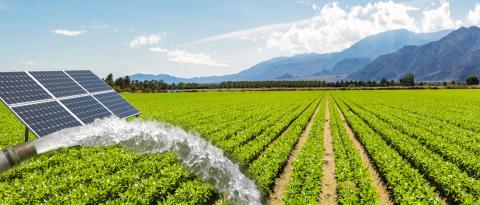ECREEE aims to increase the use of solar energy to boost agriculture in West Africa
The Food and Agriculture Organization of the United Nations (FAO) in partnership with the ECOWAS Centre for Renewable Energy and Energy Efficiency (ECREEE), organized a webinar under the theme ‘Solar Energy and Agricultural Development in West Africa’, on December 14th, 2022. More than 30 stakeholders and partners took part in the webinar which provided an excellent environment to discuss mechanisms on how to further integrate renewable energy to optimize agricultural productivity in the region.
ECREEE provided a comprehensive review of the opportunities and benefits of incorporating renewable energy into the agro-sylvo-pastoral sector as well as into fishery activities. Mr. Francis Semporé, Executive Director of ECREEE, stressed that agriculture is the main economic activity in the ECOWAS region, contributing to about 35% of the GDP and employing around 65% of the population in the West African region. The director demonstrated the willingness of ECREEE to fully collaborate with FAO in this endeavor in making the use of renewable energy in agriculture a regular and broad practice, not an exception.
The Centre has experience in promoting agriculture through renewable energy through its project: Promoting Agricultural Competitiveness through Solar Energy (PAC-SOLAR). The scheme sought to support the region’s agricultural businesses to produce more through the affordable and reliable option of harnessing its abundant renewable energy resources towards providing a stable supply of water for irrigation and other agricultural purposes.
FAO has also been playing a crucial role by providing vital support in improving access to and efficient use of water for sustainable agricultural intensification, and income generation through the use and dissemination of solar energy infrastructure, in ECOWAS Member States such as Burkina Faso, The Gambia, Mali, Niger, and Senegal.
Robert Guéi, the FAO Sub-Regional Coordinator for West Africa, elaborated on how energy and food systems are deeply connected as nearly 30% of the world’s energy is consumed in agri-food systems. Both sectors need transformation through technological innovations to meet the increasing demand for food as well as energy, in an equitable, inclusive, and environmentally-friendly manner.





